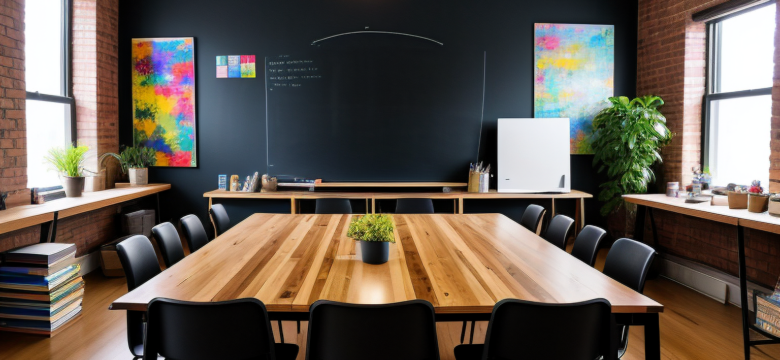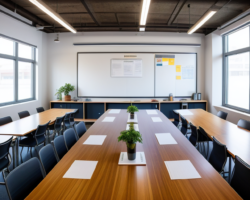In today’s fast-paced world, workshops are more than just a gathering of minds; they are a dynamic platform for learning and collaboration. Imagine stepping into a room filled with eager participants, ready to absorb new ideas and share their insights. This is the essence of a successful workshop! By implementing innovative workshop ideas, you can create an atmosphere that not only enhances learning experiences but also boosts engagement and fosters collaboration among attendees.
Have you ever considered how the right approach can transform a mundane session into an unforgettable event? It’s all about understanding your audience and tailoring activities that resonate with them. From interactive activities that captivate attention to icebreakers that dissolve barriers, every element plays a crucial role in shaping the workshop’s success. Think of it as crafting a recipe; each ingredient must be carefully selected to create a delightful dish!
So, what are these innovative ideas that can elevate your workshops? Let’s dive into techniques that promise to make your sessions not just informative, but memorable. Whether it’s through engaging discussions, creative problem-solving exercises, or leveraging technology for enhanced learning, the possibilities are endless. Join us as we explore these concepts and unleash the full potential of your workshops!
Understanding Workshop Objectives
Defining clear objectives is crucial for any workshop. Think of your workshop as a journey; without a map, you might end up lost! It’s essential to set specific, measurable goals that align with participants’ needs and expectations. This ensures a focused and productive session. When participants understand the objectives, they can engage more meaningfully, making the workshop not just a series of activities, but a cohesive learning experience.
Consider the following key points when establishing your workshop objectives:
- Specificity: Be precise about what you want to achieve. Instead of saying “improve skills,” specify “enhance public speaking skills.”
- Measurability: Define how you will measure success. Will you use surveys, quizzes, or participant feedback?
- Relevance: Ensure the objectives are relevant to the participants’ needs. Ask them what they hope to gain.
- Time-bound: Set a timeline for achieving these goals during the workshop.
By focusing on these aspects, you create a roadmap that guides both you and the participants, making the experience not only more enjoyable but also more effective. Remember, a well-defined objective is like a lighthouse in a storm; it keeps everyone on course!
Interactive Activities to Engage Participants
Engagement is the secret sauce that can transform an ordinary workshop into an extraordinary experience. When participants are actively involved, they not only absorb information better but also contribute to a lively atmosphere. Imagine a workshop where everyone is buzzing with excitement and sharing ideas—sounds fantastic, right? To achieve this, incorporating interactive activities is essential. These activities can range from collaborative projects to gamified learning experiences that break the monotony of traditional lectures.
One effective method is to use group discussions that encourage participants to share their thoughts on specific topics. This not only fosters a sense of community but also allows for diverse perspectives to emerge. For instance, consider using a brainstorming session where participants can jot down their ideas on sticky notes and place them on a wall. This visual representation of ideas can spark further discussion and creativity.
Another engaging approach is to incorporate role-playing exercises. By stepping into someone else’s shoes, participants can explore different viewpoints and develop empathy. These activities not only make learning fun but also enhance critical thinking skills. Additionally, using technology, such as interactive polling or live quizzes, can further elevate the engagement level, making participants feel more involved and invested in the workshop.
In conclusion, the key to a successful workshop lies in creating an environment that encourages participation and collaboration. By integrating various interactive activities, you can ensure that your workshop is not just another event but a memorable journey of learning and connection.
Icebreakers to Foster Connections
Starting a workshop on the right foot is essential, and icebreakers play a pivotal role in achieving that. These engaging activities not only lighten the mood but also help participants feel more at ease, paving the way for open communication. Imagine walking into a room full of strangers; it can feel a bit daunting, right? Icebreakers transform that initial awkwardness into camaraderie, creating a space where everyone feels valued and included.
One effective icebreaker could be the “Two Truths and a Lie” game. In this activity, each participant shares two true statements and one falsehood about themselves. The rest of the group then guesses which one is the lie. This not only sparks laughter but also encourages participants to learn intriguing facts about one another. Alternatively, consider using a “Human Bingo” card, where attendees mingle to find others who match specific traits or experiences. This interactive quest fosters connections and sets a collaborative tone for the workshop ahead.
Ultimately, the goal of these icebreakers is to create a warm, inviting atmosphere that encourages participants to engage fully. By breaking down barriers, you’re not just enhancing the workshop experience; you’re also building a community that thrives on collaboration and shared learning.
Team-Building Exercises
When it comes to , the goal is to create a sense of unity and trust among participants. Imagine walking into a room filled with strangers, but by the end of the session, everyone feels like old friends. This transformation is the magic of effective team-building activities. They not only break the ice but also foster a collaborative spirit that can enhance productivity in the workplace.
One popular exercise is the “Trust Fall”, where participants take turns falling backwards, relying on their teammates to catch them. This simple yet powerful activity teaches the importance of trust and communication. Another engaging option is the “Marshmallow Challenge”, where teams compete to build the tallest structure using spaghetti, tape, and a marshmallow. This exercise encourages creativity, problem-solving, and teamwork, all while keeping the atmosphere light and fun.
It’s crucial to choose exercises that align with the group’s dynamics and objectives. For example, if the team is new and lacks familiarity, icebreaker activities like “Two Truths and a Lie” can be effective. Conversely, if the team is already acquainted, diving into more complex challenges can help deepen their collaboration. Ultimately, the right team-building exercises can transform a group of individuals into a cohesive unit, ready to tackle any challenge together.
Creative Problem-Solving Activities
When it comes to igniting creativity in a workshop, are your secret weapon. These activities not only stimulate critical thinking but also encourage participants to collaborate in tackling real-world challenges. Imagine a room buzzing with energy as groups brainstorm solutions, each idea sparking another like a chain reaction of innovation.
One effective approach is to use the “Design Thinking” methodology, which involves empathising with users, defining problems, ideating solutions, prototyping, and testing. By guiding participants through these stages, you can create an immersive experience that fosters deep understanding and creativity. For example, you could present a common challenge faced by the industry and ask teams to develop a prototype solution within a limited timeframe. This not only brings out their creative juices but also teaches them to work under pressure.
Additionally, consider implementing role-playing scenarios where participants assume different perspectives. This technique allows them to step into someone else’s shoes, enhancing empathy and broadening their understanding of the problem at hand. The result? A richer pool of ideas and solutions that might not have emerged otherwise.
Incorporating these activities can transform a mundane workshop into a vibrant space of innovation. So, are you ready to unleash the creative potential of your participants and watch them thrive?
Utilising Technology for Enhanced Learning
In today’s fast-paced world, technology has become an essential ally in enhancing the learning experience during workshops. Imagine transforming a traditional session into an interactive adventure that keeps participants on the edge of their seats! By integrating various digital tools, you can create an engaging environment that not only captivates but also fosters collaboration and creativity.
One of the most effective ways to leverage technology is through the use of collaborative platforms like Google Workspace or Microsoft Teams. These tools allow participants to work together in real-time, share ideas, and provide instant feedback, making the learning process more dynamic. Additionally, incorporating polling apps such as Mentimeter or Kahoot can transform mundane presentations into lively discussions, encouraging everyone to voice their opinions and participate actively.
Moreover, consider using virtual reality (VR) or augmented reality (AR) technologies to immerse participants in real-world scenarios. This not only enhances understanding but also makes learning memorable. For example, a workshop on environmental issues could employ AR to simulate the impact of climate change, making the experience both educational and impactful.
Ultimately, the key is to blend technology seamlessly into your workshop design, ensuring it complements the learning objectives rather than overwhelming participants. By doing so, you create a stimulating atmosphere that not only enhances learning but also leaves a lasting impression.
Evaluating Workshop Success
Assessing the effectiveness of a workshop is not just a box-ticking exercise; it’s the key to unlocking future success. Think of it as a treasure map: the more accurately you evaluate, the closer you get to the prize of enhanced learning experiences. To truly gauge how well your workshop has performed, you need to gather feedback from participants. This can be done through various methods, such as surveys, one-on-one interviews, or even informal discussions. Each piece of feedback is like a puzzle piece, helping you see the bigger picture.
When collecting feedback, focus on specific areas, including:
- Participant engagement and interaction
- Achievement of workshop objectives
- Quality of materials and resources used
- Overall satisfaction with the experience
Once you have this data, analyse it to identify trends and areas needing improvement. You might find that certain activities were a hit while others fell flat, akin to discovering which ingredients made your dish a culinary masterpiece. By continually refining your approach based on this feedback, you ensure that each workshop becomes a stepping stone towards greater effectiveness and participant satisfaction.
In conclusion, evaluating workshop success is an ongoing journey. Embrace the feedback, make adjustments, and watch as your workshops transform into powerful, engaging experiences that resonate with participants long after they leave the room.
Frequently Asked Questions
- What are the key objectives for a successful workshop?
Defining clear objectives is essential. Focus on setting specific, measurable goals that align with the needs and expectations of your participants. This ensures a productive session where everyone knows what to aim for.
- How can I engage participants during a workshop?
Engagement is crucial! Incorporate interactive activities, such as group discussions, hands-on tasks, and icebreakers. These elements not only captivate your audience but also promote active learning and collaboration.
- What role does technology play in workshops?
Technology can significantly enhance the learning experience. Utilising digital tools and platforms for interactive sessions can facilitate better collaboration, feedback, and engagement, making your workshops more efficient and enjoyable.
- How do I evaluate the success of my workshop?
Gather feedback through surveys and discussions to assess the effectiveness of your workshop. Measuring outcomes against your objectives will help identify areas for improvement, ensuring your future workshops are even better!





